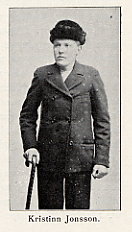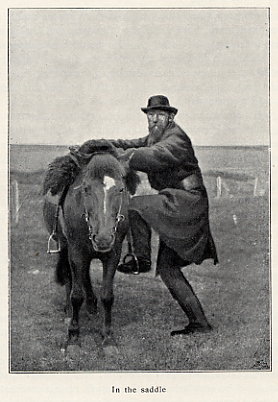| |
This story deals with a young Icelander's wonderful
adventures in the uninhabited districts of the interior of his
native country. It is a modern Saga, in which courage,
perseverance and energy are depicted.
The hero of this Saga, is Kristinn Jonsson a labourer at
Tjarnir, where I met him. I had heard about him, and
expected to see a man full of physical strength and energy,
and was therefore very astonished
to see a sickly looking young man
enter the room. He was a cripple,
and walked with a stick. I chatted
with him for some time, and at my
request, he told me his adventures,
which I shall endeavour to relate here.

Kristinn Jonsson.
In the month of September, people from the valleys go up to the
mountains a second time to fetch their sheep.
Early in the morning, September 27th 1898), Kristinn Jonsson,
together with two other men left Tjarnir, intending to return in
the evening, so they took neither food nor warm coats with
them. They left their horses on the plateau, south east of
the valley, and proceeded in different directions to look for
the sheep. They were soon overtaken by a dense fog, and were
compelled to turn back, but Kristinn mistook the road, and
went towards the south east, instead of going in the
direction of Tjarnir. He came to a river, (the Bergkvísl) when he
at once knew that he had lost his way, for had he been on the
right track, he would not have encountered a stream. After
having weighed the matter over, he decided to follow the
course of the river, feeling sure that it would lead him to
inhabited places. It was still foggy, but not very dark, and
Kristinn hurried on without stopping to rest. He was hungry,
but as he had no food, he drank of the water in the river.
Early next morning he arrived at the junction of
another river, (the Thjórsás most northern tributary) with the
first river; hoping soon to reach inhabited districts, he waded
across and continued following the river. It was still damp
and foggy, and as it was growing dark, and Kristinn was
very tired, after having walked 36 hours, he lay down to
rest, in the shelter of a big rock.
He thought of those at home, and how anxious they must
be, and, praying to God soon to lead him to a Bvgd, he fell
asleep. The night was very cold, although it was not freezing.
When Kristinn awoke, the fog had disappeared, and the
sun was shining. He saw to his astonishment, that he was
close to a glacier, which however he did not know was the Hofs-
jökull, but he was convinced that he had not gone in the direc-
tion of the Skagafjördur, but towards the south. Knowing that
he could not find his way back to Tjarnir, he continued his
course along the river, quite certain of its leading to human
habitations but he had no idea that they were so distant.
He was conscious of the danger of being quite alone in the
mountains, with the prospect of spending several days there,
without food and with nothing to protect him from the
cold. But Kristinn did not despair; he prayed to God, and
plodded bravely on.
Late in the evening he reached the south end of the
glacier; he was so fatigued, that he lay down in the sand to
sleep, although the weather was very cold. He awoke, after a
short sleep, and dragged himself along; he was getting
weaker and weaker, but never felt hungry, though he suffered so
much from thirst that he had constantly to drink water.
In the evening of the fourth day, after a most fatiguing
walk in damp, cold weather, he came to the junction of the
main river with a stream which did not come from the
glacier. No shelter was to be found, so he slept at the foot of
a hill near the river, exposed to the cold.
He wore a cap, but no comforter, a coat, the collar of
which he turned up at night, and shoes made of hide.
Fortunately he had on two pairs of stockings, for his shoes
were so worn, that they afforded hardly any protection to his
feet.
He came across horse tracks, which led him to believe
that he would soon meet people, but the peasants had al-
ready driven their sheep down from the mountains, so there
was no likelihood of his meeting them.
On the fifth day when he awoke, he was seized with an
indescribable longing to be among human beings again, and he
cried out; "Haa aa aa", as the peasants do when they
call their sheep. But he got no reply not a living thing
was to be seen in this silent desert, surrounded by ice. A
feeling of loneliness crept over Kristinn, but nothing seemed
to daunt his courage; he prayed, and walked on dauntlessly,
suffering physically and mentally, never losing sight of the
beautiful Thjórsá, which he knew must lead him to a Bygd.
Broken down by incessant walking, wet and shivering, on
he went. He suffered from thirst, but was not hungry,
although he had not tasted food for so many days.
That night he discovered a hut, used by the peasants when
they collect their sheep, and here he rested. It was freezing, and
Kristinn felt his feet getting colder and colder. The following
day he had no feeling in them, and his hands were blue
with chilblains.
The weather was bright and frosty, and Kristinn proceeded
with incredible energy along the sparkling river that raised his
hopes, and seemed to spur him on. A grand snow-capped
mountain (the Hekla) gleamed in the sunshine, on the
opposite bank of the river. In front of him, but far ahead, was a
smaller mountain, (the Búrfell) which he made for, crossing
grassy plains and feeling convinced that he was at last near
some inhabited place but alas, too late perhaps! His feet
were not painful, but very swollen, and he was obliged to
rest every moment, as he felt so weak, that he thought he
must die.
That night he hardly slept, for there was a keen wind which
made him shiver, and he kept wondering if it would be
possible to proceed further next-day. Then he thought of his
mother, and how grieved she would be to hear that he had
disappeared, and had probably perished in the mountains. His
only thought now was to meet with people who would tell
her what had become of him, and who would bury him.
On the seventh day, with the greatest difficulty, he
reached a little wood, near the Burfell. It was quite impossible
for him to go any further. Believing that death was
approaching, and hoping to be happy in the next world, he fell
asleep under a bush.
Next morning, (Oct. 4th. the 8th day), he awoke and tried to
go on once more, but in vain, he fell down, and lay for some
hours, in a state of lethargy. The instinct of
selfpreservation roused him however; he arose and looked around; the
sight that met his eyes gave him hope, for some horses were
grazing just outside the wood. He tried to reach the horses,
but could not move his feet, and as he saw no one, he
decided to lie down and wait, but all of a sudden a man
appeared, only a few paces off, who turned out to be Eirikur
Olafsson, from a farm in the neighbourhood. He advanced
towards Kristinn saying: "Komdu sæll" (be greeted), and
then he asked him who he was, and whence he had come.
Kristinn told him how he had lost his way, and that he
did not know where he was. Eirikur clasped his hands and
told him, he was in Árnes-Sysla. Eirikur offered Kristinn
something to eat, but strange enough, he had lost all
inclination for food, and only took a small piece of meat. He no
longer felt sleepy, the joy of being with his fellow-creatures
kept him awake. The horses were quickly saddled; Kristinn
was able to mount one, Eirikur's boy riding on the one side
and Eirikur himself on the other, so as to support him.
After a ride of three hours they came to the farm Aslakstadir,
where Kristinn was put to bed; as soon as he began to get
warm, he felt the most dreadful pains in his feet and legs.
First one doctor was fetched, then another, but they could
do nothing; mortification had set in. Kristinn was ill three
weeks, then he was taken further south on a stretcher,
between two horses, and driven to Reykjavik, where all his toes
were amputated.
People were most enthusiastic about the young man's
courage and perseverance, and helped him in every way.
After some time, he was well enough to proceed home, where
he was received with open arms. They had searched for him
in the mountains several times, but had at last given up all
hope of seeing him again.
Kristinn had walked at least 170 kirns, right across the
most barren parts of Iceland. He is a cripple, but resigned
and happy, and still works at the farm.
Kristinn is a living proof, that the primitive force and
sterling qualities of the Northmen, still exist in Iceland.
From Tjarnir we returned to Akureyri through the picto-
resque valley of Eyjafjordur in two days.

In the saddle
|
|




![]() Zurück zu Inhalt
Zurück zu Inhalt![]() nächstes Kapitel
nächstes Kapitel